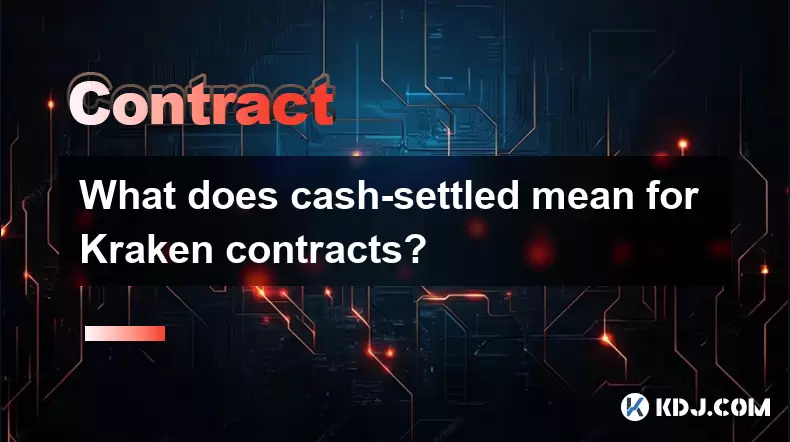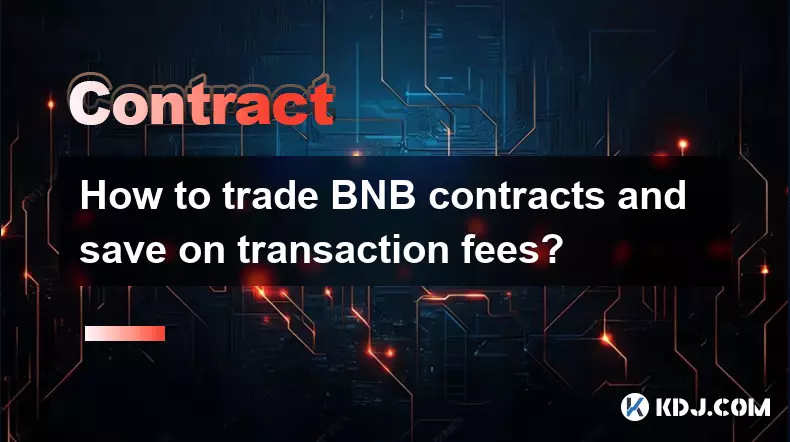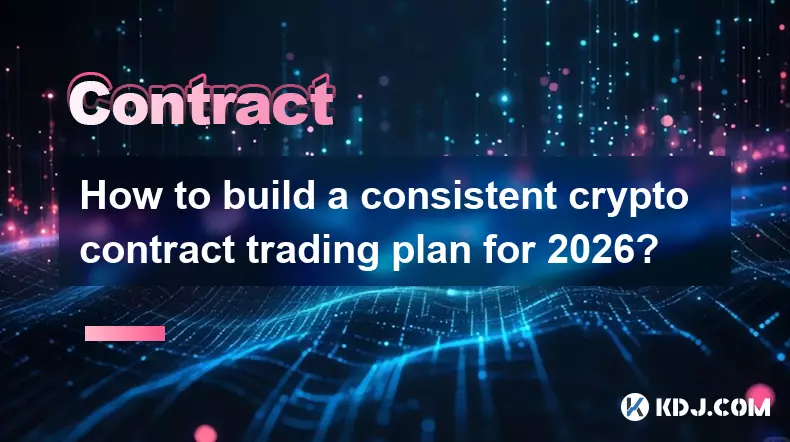-
 bitcoin
bitcoin $87959.907984 USD
1.34% -
 ethereum
ethereum $2920.497338 USD
3.04% -
 tether
tether $0.999775 USD
0.00% -
 xrp
xrp $2.237324 USD
8.12% -
 bnb
bnb $860.243768 USD
0.90% -
 solana
solana $138.089498 USD
5.43% -
 usd-coin
usd-coin $0.999807 USD
0.01% -
 tron
tron $0.272801 USD
-1.53% -
 dogecoin
dogecoin $0.150904 USD
2.96% -
 cardano
cardano $0.421635 USD
1.97% -
 hyperliquid
hyperliquid $32.152445 USD
2.23% -
 bitcoin-cash
bitcoin-cash $533.301069 USD
-1.94% -
 chainlink
chainlink $12.953417 USD
2.68% -
 unus-sed-leo
unus-sed-leo $9.535951 USD
0.73% -
 zcash
zcash $521.483386 USD
-2.87%
What does cash-settled mean for Kraken contracts?
Cash-settled contracts on Kraken pay profits or losses in USD or USDT at expiry, avoiding crypto custody and simplifying trading for users.
Aug 13, 2025 at 11:36 am

Understanding Cash-Settled Contracts on Kraken
Cash-settled contracts on Kraken refer to financial derivatives where the settlement occurs in cash rather than physical delivery of the underlying asset. When a futures or options contract reaches its expiration, instead of transferring the actual cryptocurrency—such as Bitcoin or Ethereum—the difference between the entry price and the settlement price is paid out in stablecoin or fiat currency. This mechanism is particularly useful for traders who want exposure to price movements without managing the custody or transfer of digital assets.
For example, if a trader holds a cash-settled Bitcoin futures contract and the market price of Bitcoin rises above their entry point at expiration, Kraken will credit the profit in USDT, USD, or another supported cash equivalent directly to their account. The reverse applies if the price drops—the account is debited accordingly. This process eliminates the need for wallet management, private key handling, or blockchain transaction fees associated with receiving or sending crypto.
Differences Between Cash-Settled and Physically-Settled Contracts
One of the core distinctions on Kraken is between cash-settled and physically-settled contracts. Physically-settled contracts require the actual transfer of the underlying cryptocurrency upon expiry. For instance, buying a physically-settled BTC/USD futures contract means you would receive Bitcoin at the end of the contract term. In contrast, cash-settled contracts bypass this transfer.
This difference affects user experience in several ways. Users opting for cash settlement do not need to worry about wallet compatibility, withdrawal limits, or network congestion. They also avoid potential tax complications that may arise from frequent crypto transfers. Moreover, cash-settled instruments are often more accessible to institutional traders who prefer to keep positions denominated in fiat or stablecoins for accounting and risk management purposes.
Kraken clearly labels which contracts are cash-settled in the product specifications. Traders should review the contract details page before opening a position to confirm the settlement type. Misunderstanding this can lead to unexpected outcomes, especially during expiration events.
How Cash Settlement Works on Kraken: Step-by-Step Process
The cash settlement process on Kraken follows a precise sequence designed to ensure fairness and transparency:
- Position monitoring: Kraken continuously tracks open positions as the expiration date approaches. The system uses a mark price derived from external indices to prevent manipulation.
- Final price determination: At expiration, Kraken calculates the settlement price using a time-weighted average price (TWAP) from reputable spot exchanges over a defined window, typically 30 minutes before expiry.
- Profit/loss calculation: The platform computes the difference between the trader’s entry price and the final settlement price. This value is multiplied by the contract size to determine the cash payout.
- Account adjustment: The resulting amount is credited or debited in cash terms (e.g., USD or USDT) to the trader’s futures wallet. No blockchain transaction occurs.
- Position closure: The contract is automatically closed, and the position status changes to “settled” in the trading interface.
This entire process is automated. Traders do not need to take manual action unless they wish to close their position before expiry. The use of TWAP and index pricing ensures that settlement reflects genuine market conditions and reduces the risk of price spikes affecting outcomes unfairly.
Supported Assets and Pairs for Cash-Settled Contracts
Kraken offers cash-settled contracts on a range of major cryptocurrencies. These include BTC/USD, ETH/USD, XRP/USD, and others, with settlements typically conducted in USD or USDT. The availability of stablecoin settlement adds flexibility, especially during periods of high volatility in fiat exchange rates.
Each cash-settled product has specific terms outlined in its contract specification. Traders can find these details under the “Futures” or “Derivatives” section of the Kraken Pro platform. Key information includes:
- Underlying asset
- Contract size (e.g., 1 USD per contract)
- Settlement currency (USD, USDT)
- Expiry schedule (weekly, quarterly)
- Settlement method (cash vs. physical)
It is crucial to verify the settlement currency because some contracts settle in USD while others use USDT. This impacts liquidity, tax reporting, and fund usability within the Kraken ecosystem.
Risks and Considerations for Traders
While cash-settled contracts simplify trading, they come with specific risks. One major factor is funding rate exposure in perpetual contracts, which are always cash-settled on Kraken. These contracts do not expire but require periodic payments between long and short positions based on price differentials. Traders holding positions overnight must account for these costs.
Another consideration is leverage. Cash-settled futures often allow high leverage, amplifying both gains and losses. A sudden market move can trigger liquidation before the trader has time to react. Kraken uses a liquidation engine that monitors margin levels in real time and may close positions automatically if equity falls below maintenance requirements.
Tax treatment is also a concern. Even though no crypto is transferred, capital gains or income tax may still apply to the cash profit, depending on jurisdiction. Traders should maintain accurate records of all settlements, including timestamps, settlement prices, and amounts credited.
Frequently Asked Questions
Can I convert my cash-settled profits into cryptocurrency on Kraken?Yes. After a cash-settled contract expires and profits are credited in USD or USDT, you can use Kraken’s spot trading interface to buy any supported cryptocurrency. Navigate to the spot market, select your desired pair (e.g., BTC/USDT), and place a market or limit order using the settled funds.
Do cash-settled contracts incur withdrawal fees when I move the funds?No. Since the settlement occurs within your Kraken account as cash or stablecoin, no blockchain transaction is involved. You only incur fees if you later withdraw USD to a bank account or send USDT to an external wallet. These fees depend on the withdrawal method and network used.
Are all Kraken futures contracts cash-settled?No. Kraken offers both cash-settled and physically-settled futures. Perpetual swaps are always cash-settled, while certain quarterly futures may be physically-settled. Always check the contract details page for the settlement type before trading.
What happens if I hold a cash-settled contract through expiration?The contract will be automatically settled using the final index price. Your futures wallet will be adjusted with the cash difference, and the position will be closed. No action is required on your part, but ensure you have sufficient margin to cover potential losses up to the moment of settlement.
Disclaimer:info@kdj.com
The information provided is not trading advice. kdj.com does not assume any responsibility for any investments made based on the information provided in this article. Cryptocurrencies are highly volatile and it is highly recommended that you invest with caution after thorough research!
If you believe that the content used on this website infringes your copyright, please contact us immediately (info@kdj.com) and we will delete it promptly.
- Coast Mountain Transit Workers Kick Off Bargaining, Demanding Fair Wages and Safer Conditions
- 2026-02-03 09:55:01
- Trump, Cryptocurrency, Unprecedented Claim: A Digital Divide in the Empire State
- 2026-02-03 10:00:02
- Natural Gas Prices Plummet Amid Warmer Forecasts, Supply Rebound
- 2026-02-03 09:50:01
- Michael Saylor's $54 Billion Bitcoin Gamble Faces Maturity Wall Amidst Shifting Crypto Landscape
- 2026-02-03 09:45:01
- MYX Rallies Amidst Market Weakness, But Concerns Remain for Sustained Momentum
- 2026-02-03 06:55:02
- Kaspa's $0.03 Brink: One Analyst Bets $100,000 on Fundamentals, Or Bust
- 2026-02-03 07:00:01
Related knowledge

How to close a crypto contract position manually or automatically?
Feb 01,2026 at 11:19pm
Manual Position Closure Process1. Log into the trading platform where the contract is active and navigate to the 'Positions' or 'Open Orders' tab. 2. ...

How to understand the impact of Bitcoin ETFs on crypto contracts?
Feb 01,2026 at 04:19pm
Bitcoin ETFs and Market Liquidity1. Bitcoin ETFs introduce institutional capital directly into the spot market, increasing order book depth and reduci...

How to trade DeFi contracts during the current liquidity surge?
Feb 01,2026 at 07:00am
Understanding Liquidity Dynamics in DeFi Protocols1. Liquidity surges in DeFi are often triggered by coordinated capital inflows from yield farming in...

How to use social trading to copy crypto contract experts?
Feb 02,2026 at 07:40am
Understanding Social Trading Platforms1. Social trading platforms integrate real-time market data with user interaction features, enabling traders to ...

How to trade BNB contracts and save on transaction fees?
Feb 03,2026 at 12:39am
Understanding BNB Contract Trading Mechanics1. BNB contracts are derivative instruments traded on Binance Futures, allowing users to gain leveraged ex...

How to build a consistent crypto contract trading plan for 2026?
Feb 02,2026 at 10:59pm
Defining Contract Specifications1. Selecting the underlying asset requires evaluating liquidity depth, historical volatility, and exchange support acr...

How to close a crypto contract position manually or automatically?
Feb 01,2026 at 11:19pm
Manual Position Closure Process1. Log into the trading platform where the contract is active and navigate to the 'Positions' or 'Open Orders' tab. 2. ...

How to understand the impact of Bitcoin ETFs on crypto contracts?
Feb 01,2026 at 04:19pm
Bitcoin ETFs and Market Liquidity1. Bitcoin ETFs introduce institutional capital directly into the spot market, increasing order book depth and reduci...

How to trade DeFi contracts during the current liquidity surge?
Feb 01,2026 at 07:00am
Understanding Liquidity Dynamics in DeFi Protocols1. Liquidity surges in DeFi are often triggered by coordinated capital inflows from yield farming in...

How to use social trading to copy crypto contract experts?
Feb 02,2026 at 07:40am
Understanding Social Trading Platforms1. Social trading platforms integrate real-time market data with user interaction features, enabling traders to ...

How to trade BNB contracts and save on transaction fees?
Feb 03,2026 at 12:39am
Understanding BNB Contract Trading Mechanics1. BNB contracts are derivative instruments traded on Binance Futures, allowing users to gain leveraged ex...

How to build a consistent crypto contract trading plan for 2026?
Feb 02,2026 at 10:59pm
Defining Contract Specifications1. Selecting the underlying asset requires evaluating liquidity depth, historical volatility, and exchange support acr...
See all articles










































































